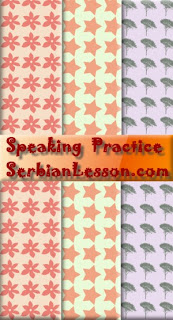 |
| A photo I took the other day - just for you :) |
If you don't understand what's being said ( or written ) in Serbian, you can always ask questions such as:
- Šta znači " Gazda bio, gazda ost'o 100 % " ? = What does "..." mean ?
- Ne razumem = I don't understand
- Možeš li da mi objasniš (šta znači) "..." ? = Can you explain what "..." mean ?
- Možeš li da ponoviš "..." ? = Can you repeat "..." ?
- Ponovi još jednom, molim te ? = Repeat once again, please ?
- Molim ? = Pardon ?
- Možeš li da ponoviš malo sporije ? = Can you repeat it a bit slower ?
- Kako se izgovara ova reč ? = How do you pronounce this word ?
- Kako se čita ova reč / ovo slovo ? = How do I read this word / letter ?
- Kako se piše slovo "ć" ? = How do you write letter "ć" ?
Da li neko ima ideju kako najbolje prevesti " Gazda bio, gazda ost'o 100 %" ?

.png)














